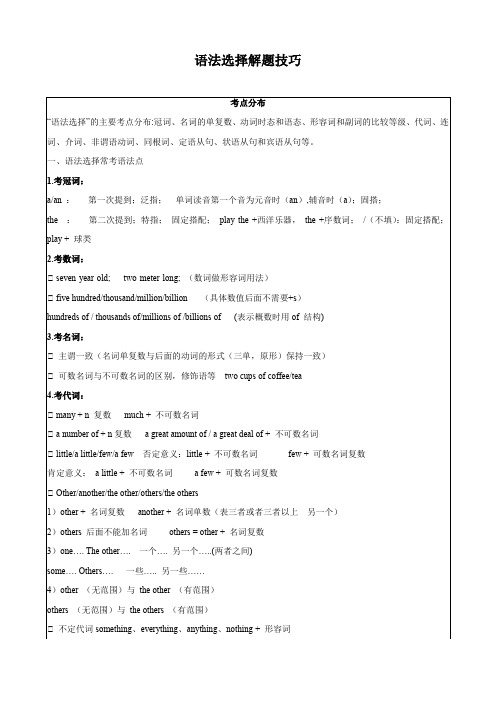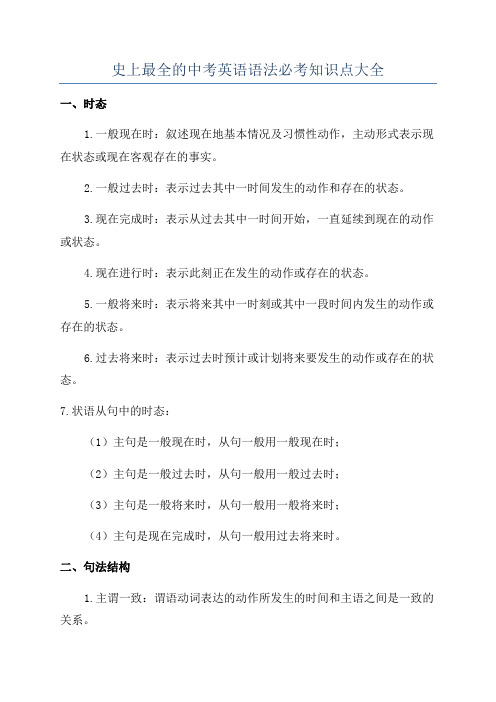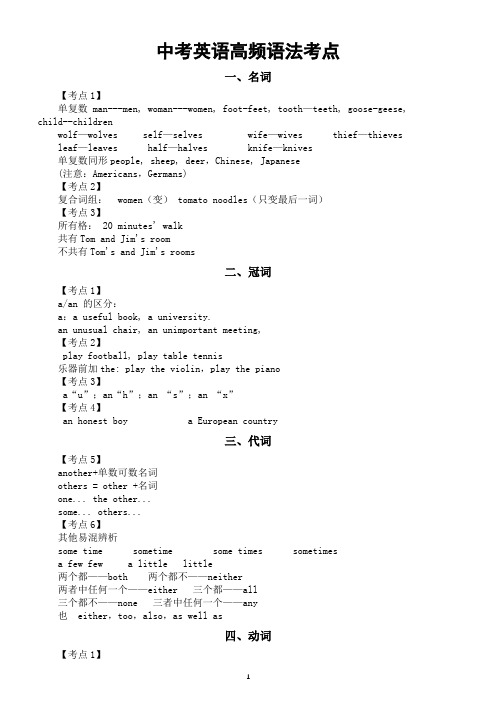中考英语语法选择常考考点讲解
专题11-语法选择解题技巧-2024届中考英语题型过关(解析版)

语法选择解题技巧① 人称代词1)主语用主格2)动词/介词后用宾格;3)空格后有名词,用形容词性物主代词,没有名词则用名词性物主代词;名词性物主代词= 形容词性物主代词+ 具体的名词4)反身代词常考enjoy oneself / help yourself / dress oneself / teach oneself;5. 考形容词/副词① -ed是修饰人,-ing是修饰事物① 形容词修饰名词,副词(一般以ly 结尾)修饰动词,副词修饰形容词① 出现than, 用比较级① 出现as…. as 结构,用形容词/副词原级① one of + adj最高级+ n 复数6.考介词① 时间介词at: 用于具体时刻、节日前,例如:at 8:00,at Christmas. 固定搭配:at noon, at nightin: 用于世纪、年、季节、月份等不具体的时间前,例如:in 2011固定搭配:in the morning/afternoon/eveningon: 用于具体的某一天,或具体的早上、下午、晚上; 星期。
on the afternoon of May 5th on a cold day,on Monday/ Tuesday …for/since: 后面+一段时间,现在完成时的标志① 其它介词with:与...一起,和...;带着...,有...的;以(手段、材料),用(工具)without: 没有。
by + 交通工具① 介词+ doing after/before doing; in doing ; for doing …7.考连词but/however:表示转折关系;(but后无逗号;however, 后须有逗号)so/therefore/thus:表示因果关系;or:或者、否则之意。
and:表示并列关系;though/although:表示虽然……但是,不能与but连用。
all:表示全部都,用于三者以上;none: 表示没有人,用于三者或三者以上(侧重指人,表否定)both...and:表示两者都;either...or:表示两者之一(选择);neither...nor:表示两者中没有一个;either: 用于句末,表示两者的否定too: 用于句末,表示两者的肯定also: 用于句中,表示也8.考动词:一看:有无时态标志;单复数标志;二看:空格前有无情态动词(情态动词+do)、介词(介词+Ving)三看:并列结构;有无and/or (如有则观察and/or前或后的动词形式,答案选项的形式要与其保持一致)四看:固定搭配,如make/let sb do sth , see sb do/doing sth 等9.考被动语态被动语态:be (is/are/am/was/were) + done(过去分词)含有情态动词的被动语态:should/must/can/could/may/might……be done10. 考定语从句:跟在名词/代词后面,修饰名词/代词修饰人:who 修饰物:which11. 考宾语从句:跟在谓语后面三要素:① 引导词① 时态当主句为一般现在时时,从句可以为任何时态;当主句为一般过去时时,从句必须用过去时态;当从句为表示客观事实,真理时,不管主句是什么时态,从句都用一般现在时;① 语序:陈序语序12. 考词性-tion 一般为名词后缀separation, selection,-ness 一般为名词后缀calmness-ly 一般为副词后缀luckily, fortunately,-ful 一般为形容词后缀careful,-ing/-ed 一般为形容词后缀-ing形容的是物;-ed形容的是人13. 固定搭配pick up 捡起解题方法方法一:上下文推断法根据上下文的提示或暗示,体验语境和作者的情感态度,结合语法知识,选出符合场景的最佳选项。
2023年初中英语中考复习——语法选择解题技巧

( B )1. A. look ( D )2. A. thousand ( D )3. A. explore ( A )4. A. as ( A )5. A. safe ( B )6. A. they ( C )7. A. whom ( B )8. A. die ( A )9. A. shouldn't ( C )10. A. if ( D )11. A. Luck ( C )12. A. at ( B )13. A. a ( D )14. A. sends ( A )15. A. another
【案例演示】 阅读下面短文,按照句子结构的语法性和上下文连贯的要求,从1—15各题所给的A、B、C和D项中选出最佳选项,并
在答题卡上将该项涂黑。
The first astronauts Since the earliest times, people have looked up at the stars, the moon and the planets. Today people use modern machines 1 at the sky. This is very different from the situation 2 years ago when people could only use their eyes. Perhaps they dreamed of 3 the universe. When did humans first go into space? The story began not so very long ago, 4 the first astronauts were not people—they were animals. Scientists wanted to make travelling to space as 5 as possible for humans. So they decided to experiment with animals and test 6 in spaceflights. Insects, mice, frogs, dogs and monkeys were some of the animals 7 first went into space. Many of them 8 , but they helped to make space travel safer for humans. For their great service, we 9 forget these animals. Albert Ⅱ was the first monkey to go into space in 1949. Sadly he died 10 his spaceship landed back on Earth. 11 the result was different for Ham the Monkey. His story ended happily when he return to earth 12 very good health. Scientists wanted to know the answer to the important question: could 13 animal like Ham do the same things in space as he could do on Earth? The answer came when Ham 14 into space in 1961. Yes, he did everything well and lived for 15 16 years.
史上最全的中考英语语法必考知识点大全

史上最全的中考英语语法必考知识点大全
一、时态
1.一般现在时:叙述现在地基本情况及习惯性动作,主动形式表示现在状态或现在客观存在的事实。
2.一般过去时:表示过去其中一时间发生的动作和存在的状态。
3.现在完成时:表示从过去其中一时间开始,一直延续到现在的动作或状态。
4.现在进行时:表示此刻正在发生的动作或存在的状态。
5.一般将来时:表示将来其中一时刻或其中一段时间内发生的动作或存在的状态。
6.过去将来时:表示过去时预计或计划将来要发生的动作或存在的状态。
7.状语从句中的时态:
(1)主句是一般现在时,从句一般用一般现在时;
(2)主句是一般过去时,从句一般用一般过去时;
(3)主句是一般将来时,从句一般用一般将来时;
(4)主句是现在完成时,从句一般用过去将来时。
二、句法结构
1.主谓一致:谓语动词表达的动作所发生的时间和主语之间是一致的关系。
2.主语从句:即用疑问词引导的从句,其主语在句中充当整个句子或者句子成分的主语。
3.主谓宾:即主语、谓语动词和宾语三部分的句子结构。
4.定语从句:即用关联词引导的附加句,其作用是对主句中的一些名词或代词进行补充说明。
5.宾语从句:即用从属连词引导的从句,其作用是把从句的内容作为宾语放在动词后面。
初中英语2024届中考高频语法考点整理

中考英语高频语法考点一、名词【考点1】单复数 man---men, woman---women, foot-feet, tooth—teeth, goose-geese, child--childrenwolf—wolves self—selves wife—wives thief—thieves leaf—leaves half—halves knife—knives单复数同形people, sheep, deer,Chinese, Japanese(注意:Americans,Germans)【考点2】复合词组:women(变) tomato noodles(只变最后一词)【考点3】所有格: 20 minutes' walk共有Tom and Jim's room不共有Tom's and Jim's rooms二、冠词【考点1】a/an 的区分:a:a useful book, a university.an unusual chair, an unimportant meeting,【考点2】play football, play table tennis乐器前加the: play the violin,play the piano【考点3】a“u”;an“h”;an “s”;an “x”【考点4】an honest boy a European country三、代词【考点5】another+单数可数名词others = other +名词one... the other...some... others...【考点6】其他易混辨析some time sometime some times sometimesa few few a little little两个都——both 两个都不——neither两者中任何一个——either 三个都——all三个都不——none 三者中任何一个——any也either,too,also,as well as四、动词【考点1】时态从句与主句时态一致He said he ﹏﹏﹏(be)there for an hour.He said the moon ﹏﹏﹏(run) around the earth.(错误,应改为一般现在时态) 2)条件状语从句:主将从现I don't know if he will come tomorrow. If he comes, I will call you.I will ring you as soon as I finish my work.I won’t go out until my homework is done.【考点2】主谓一致:谓语动词跟着主语发生变化就近原则:There be 句型Eith er …or…Neither...nor...,not only...but also..就远原则:with, as well as; including;except等五、连词1、并列连词:and / but / or / both...andeither...or / neither..nor / not only...but also2、宾语从句:(1)陈述语序(2)时态(主过从过)(3)引导词(根据句意选择)3、定语从句:判断从句是否缺主语/宾语,缺→关系代词;不→缺关系副词先行词指人:who、that、whom指物:that、which所属关系:whose4、状语从句:(1)If / Unless 条件状语从句:主将从现(主将从现还有)as soon as、when(2)when / while时间状语从句:过去进行时not...until直到....才.....(3)so...that because/so although/but六、介词【考点1】介词搭配talk abouton purposeby accidentbe famous forbe good at【考点2】时间介词on(天); in(时段); at (时刻)【考点3】表伴随with / without ,或doingShe is a girl with long hair.She is a girl wearing a new dress.【考点4】表方式by bike,on foot 没有冠词“a”或名词复数speak in Englishwrite in ink【考点5】介词(不加the)+名词at table 在桌旁,且在吃饭(两层意思)at the table 在桌旁,具体干什么不清楚七、形容词、副词【考点1】同级as 原形as / not as (so)... as...This food isn't so delicious asthat food.【考点2】修饰比较级的四个词:much, a little, even, farHe is much taller than Tom.最高级典型标志词:in , of , among【考点3】比较级、最高级的不规则变化:口诀:两病两多并两好,距离老远少迟到bad/ill : worse worstmuch/many : more mostlittle :less leastgood/well : better bestfar : farther farthestfurther furthestold : older oldestelder eldest【考点4】特殊句型:比较级 and 比较级......“越来越......”more and more 越来…He is growing taller and taller.The +比较级,the +比较级...“越......越......”The sooner you come, the earlier we would arrive.She can't be more beautiful!(她漂亮极了。
2024中考英语语法必考知识点总结

2024中考英语语法必考知识点总结一、时态1.一般现在时:表经常性的动作、习惯或客观事实。
2.一般过去时:表示过去发生、结束的动作或状态。
3.一般将来时:表示将来一些时间要发生的动作。
4.现在进行时:表示现在正在进行的动作。
5.过去进行时:表示过去其中一时刻或一段时间内正在进行的动作。
6.现在完成时:表示过去发生并与现在有关的动作或状态。
7.过去完成时:表示过去其中一动作或状态发生在另一过去动作或状态之前。
8. 一般将来时(be going to):表示将要、准备或打算做事。
二、被动语态1. 被动语态的构成:be + 过去分词2.主动语态和被动语态的转换:将主动语态的宾语变为主语,同时动词的形式改为被动语态的形式。
三、虚拟语气1.If从句中的虚拟语气:a)If从句表示与事实相反的情况,主句用过去将来时。
b)If从句表示与现在事实相反的情况,主句用过去时。
c) If从句表示与过去事实相反的情况,主句要用“had + 过去分词”。
2.虚拟条件句的其他情况:a) 与现在相反:as if, though, even if等引导的条件句,主句用过去时。
b)与将来相反:引导条件状语从句的主将从现,主句用过去时。
c)与过去相反:引导条件状语从句的主将从现,主句用过去完成时。
四、宾语从句1.宾语从句:在句子中作宾语的从句。
2.宾语从句的时态:按照实际情况使用时态。
3. 宾语从句的连接词:that, whether, if等。
五、定语从句1. 定语从句的构成:关系词(who, whom, whose, which, that)+句子。
2. 指物的定语从句:关系代词用which或that,在从句中充当主语、宾语或定语。
3. 指人的定语从句:关系代词用who或that,在从句中充当主语或宾语;关系代词用whom或that,在从句中充当宾语。
4. 定语从句的连接词从句中的位置:连接词(who, whom, which, that, whose)在从句中充当成分的位置。
最新中考英语语法必考知识点归纳

最新中考英语语法必考知识点归纳中考英语语法部分是考试中的重点,需要考生掌握和熟悉各种语法知识点。
以下是最新中考英语语法必考知识点的归纳:一、时态1.现在时态:表示现在的动作或状态。
2.过去时态:表示过去发生的动作或状态。
3.将来时态:表示将来要发生的动作或状态。
二、动词1.动词的五种形式:原形、第三人称单数形式、过去式、过去分词、现在分词。
2.动词的时态和语态变化:一般时、进行时、完成时、被动语态。
三、名词1.可数名词和不可数名词的区别以及在句子中的用法。
2.单数名词和复数名词的区别以及在句子中的用法。
四、冠词1.定冠词和不定冠词的用法及其区别。
五、代词1.人称代词:主格、宾格、物主代词、反身代词。
2. 指示代词:this、that、these、those。
3. 不定代词:some、any、no、every、each等。
六、形容词和副词1.形容词的用法及其在句子中的位置。
2.形容词的比较级和最高级的构成及用法。
3.副词的用法及其在句子中的位置。
七、介词1.常见的介词及其用法。
2.介词短语在句子中的作用。
八、连词1.并列连词及其连接的句子。
2.从属连词及其连接的句子。
九、虚拟语气1.虚拟语气的用法及其在条件句中的表示。
十、直接引语和间接引语1.直接引语和间接引语的区别及其在句子中的用法。
十一、固定搭配和常见短语1.固定搭配和常见短语的用法及其在句子中的位置。
以上是最新中考英语语法必考知识点的归纳,考生需要通过学习和积累这些知识点,提升自己的语法水平,从而在考试中取得好成绩。
2024年中考英语-考纲重点语法必背

考纲重点语法必背一、考纲重点语法总结(一)一.词类(Parts of Speech)名词英文名称The Noun(缩写为n.)表示人或事物的名称例词boy,clock,book等冠词英文名称The Article(缩写为art.)用在名词前帮助说明名词所指的人和或事物。
例词a(an),the代词英文名称The Pronoun(缩写为pron)用来代替名词、形容词或是数词例词we,that,his,what形容词英文名称The Adjective(缩写为adj.)用以修饰名词,表示人或事物的特征例词old,red,fine,good.数词英文名称The Numeral(缩写为num.)表示数量或是顺序。
例词one,thirteen first动词英文名称The Verb(缩写为v.)表示动作或状态。
例词sit,go,be(am,is,are)副词英文名称The Adverb(缩写为adv.)修饰动词、形容词或其他副词。
例词not too,here,very介词英文单词The Preposition(缩写为prep.)表示名词、代词等和句中其他词的关系。
例词in,on,of,to,under.连词英文单词The Conjunction(缩写为conj.)用来连接词与词、短语与短语或句与句。
例词and,or,but.感叹词英文单词The Interjection(缩写为interj.)表示说话时的喜悦、惊讶等情感。
例词oh,hello,hi,er.二.名词(Nouns)1.总的说来,名词分专有名词和普通名词两类。
专有名词:表示具体的人,事物,地点或机构的专有名称。
Lucy China中国Asia亚洲Beijing北京。
专有名词的第一个字母要大写。
普通名词:表示某些人,某类事物,某种物质或抽象概念的名称。
例如:teacher老师tea茶reform改革普通名词又可进一步分为四类1)个体名称:表示单个的人和事物。
最新中考英语总复习第三部分常考题型指导第一节 语法选择

英语
二、命题规律
(一)2020年~2021年广东省卷中考英语“语法选择”分析
年份
题 号
考点
答案
难度
话题
语篇 试题 学科 词数 情境 素养
形容词最高
人与 思维
31
级(有比较范 围in the
the 易 longest
自然 品质( 介绍一 195 (人 侧重
2021 world)
架新的 word 与自 思维
返回
英语
例2 (2021年广东省卷节选) Some people 39 to check out the bridge before the opening. Jerry was one of them.
39. A. are inviting B. are invited C. were invited D. were inviting
[总结]语法选择中动词时态的解题方法:看首句及上下文时 态、前后动词时态、时间状语等。
返回
英语
例5 (2021年广东省卷节选) Along the river, there’s 35 eight-kilometer-long wooden walkway.
35. A. / B. a C. an D. the
返回
英语
解题技巧 方法一:上下文推断法 根据上下文的提示或暗示,体验语境和作者的情感态度,结 合语法知识,选出符合场景的最佳选项。 例1 (2021年广东省卷节选)The bridge runs 34 two mountains. 34.A.at B.under C.among D.between
返回
英语
“语法选择”与“完形填空”的考查方向和重点不同。“完形 填空”侧重考查考生对文章内容的理解和所选单词的意义的 区别,而“语法选择”则主要考查语法在篇章里的应用,侧重语 法知识的考查,即某个单词的不同形式。
- 1、下载文档前请自行甄别文档内容的完整性,平台不提供额外的编辑、内容补充、找答案等附加服务。
- 2、"仅部分预览"的文档,不可在线预览部分如存在完整性等问题,可反馈申请退款(可完整预览的文档不适用该条件!)。
- 3、如文档侵犯您的权益,请联系客服反馈,我们会尽快为您处理(人工客服工作时间:9:00-18:30)。
语法选择常考考点:一、冠词a, an, the的用法:(具体复习课本131页的内容)1.a:European , university, useful book2.an:hour, American, English teacher , African, Asian, Australian, aunt, uncle, office, email, elephant, animal, actor, earthquake, important subject, art class, interesting book,eight-year-old boy, orange pen, old man, expensive book, egg3.The:西洋乐器前,世上独一无二的事物前,特指某样东西时。
play the piano/in the sun/The girl under the tree is beautiful.二、形容词,副词,比较级,最高级1 .形容词放名词前,修饰名词,副词放动词后,修饰动词。
如:good boy/eat well2,become/get +adj.变得怎么样keep +adj.保持怎么样make sb./sth. + adj.让某人/物怎么样3.形容词放在不定代词、疑问词后,something interesting What else?enough --形前名后big enough enough money4.as/so +形容词原级+ as… 和…一样。
5.用比较级的情况:①A+be动词+形容词比较级+than+B,表示“A比B更”②Which is +比较级,…or…表示两者之间“哪个更……”③“the+比较级+主语+谓语,the+比较级+主语+谓语”表示“越……,就越……如The older she gets, the more she knows.她年纪越大,知道得越多。
④比较级+and+比较级,表示“越来越bigger and bigger越来越大▲注意:比较级前只能用much,even等词来修饰程度,加强语气。
very/so后加的时原级。
6.用最局级的情况:三者/以上比较,有of以/among等表范围的短语,如of all , in the class等时,用最高级,“the+序数词+形容词最高级”,表示“第几最……最高级的表达:①the +adj-est.(单音节形容词)②the most +adj.(双音节/多音节)三、考be动词的用法单数用is/was复数用are/were不可数用is/was常考的不可数名词有:advice, information, furniture, paper, bamboo, work, homework, housework, food, fruit, drink, rice, bread, 肉类(meat, beef, chicken, pork) 液体类(water, tea, coffee, milk, juice, cola, soup)▲注意here be, There be , not only...but also…•有就近原贝!|。
不定代词(everyone、someone等)作主语时,谓语动词用单数形式。
四、介词的用法:with:①和,与…一起;②具有,带有;③用without无,没有of....的表所属关系搭配:take photos of... a map of China at the bottle of plent offor 表目的/用途,为了;用于;对…而言be famous for... be good for for the first timefrom 来自,从…. be from=come fromfrom...to... be different from... far from...about 关于、大约as 作为,be famous as...by+交通工具=1@1<6+@/@11仙。
+交通工具;by乘坐,通过,在…旁边,被▲时间介词at /in/ on at 十 几点钟,at noon, at night, at the weekendin 十 月份,季节,年份,in the morning, in the afternoon, in the evening on +星期,节日,具体某一天(具体到几号),或具体某一天的早中晚▲注意:tomorrow, yesterday,和含有this, next, ago 的时间不需要加介词。
如:this morning, this year, next month, three years ago 五、情态动词(复习语法试卷M10-M12的内容)六、连词and (并列关系);or(and 的否认形式,或者,还是,否那么);because 因为(+句子);because of 由于(十单词/短语);so (因果关系);then (然后);before (在…之前);after (在…之后);until 直到…才Although/though (虽然);but, however,(但是,however 后有逗号隔开);when (+do> does 、did> be doing,延续性/终止性动词,表示当…的时候);while (+be doing ,延 续性动词,表示当…的时候)if (如果/是否)if 意为“如果”时,引导条件状语从句,遵循“主将从现”或“主祈从现”或“主含 情从现”。
▲注意:because 和so 不能连用,Although/though 和but 不能连用。
②看剩下的局部有无名词。
What a beautiful girl she is. What an interesting story. What clean water it is. How clever he is.八、人称代词/物主代词/反身代词先判断要填的是“谁”还是“谁的”“谁”用人称代词,主格:通常放在动词前,作主语;宾格:常放在介词,动词后。
“谁的”用物主代词,(有名那么形,无名那么名)反身代词:oneself (某人自己)常见搭配:enjoy oneself (过得愉快)by oneself (独立) teach oneself (自学)七、感叹句 做题步骤:①有主谓的,先把主谓去掉。
有单数名词用What a/an有复数名词/不可数名词用What 无名词用how九、动词的不同形式.动词原形:①一般现在时,第一,二人称,第三人称复数They often play football together.②一些固定搭配:Let's/Let sb do sth.;情态动词can/must 等+ do, pleased。
,don*t/doesn 5t/didn*t 后+ 动原,Shall we do, help sb. do sth.; make sb. do sth. had better do sth. Why not/Why don't you do. in order to do ; be able to do.动词的三单形式:一般现在时,第三人称单数He often plays football after school.1.动词的ing形式:①现在进行时/过去进行时be doing②介词后面的动词:(in/for/with/at/after/about),如:be good at doing sth.③be 动词后(如:My favourite sport is playing basketball.)④like/love/enjoy+doingsb. spend + 时间/金钱 + doing sth. practise doing sth.;mind doing sth.finish doing sth.2.动词的不定式(to do):①to do表目的。
②hope to do ;decide to do ;try to do ;learn to do;agree to do ;It's time to do ;ask sb. to do sth.;advise sb. to do allow sb. to doIt's +adj. + to do sth. be interested to doIt takes sb. + 时间 + to do sth.;It's a good idea to do try one's best to do sth.; good ways to do The best time to do how to do;pay attention to doing sth.look forward to doing sth.have trouble doing sth.good ways of doing sth. pay attention to doing sth.look forward to doing sth.have trouble doing sth.good ways of doing sth.plan to do ;promise to do;want to do= would like to do; need to do其他:stop to do sth.停下来去做某事;stop doing sth.停止正在做的事情,停止做某事see/watch/hear/notice sb. do sth.看见/观看/听到/注意到某人做了某事see/watch/hear/notice sb. doing sth.看见/观看/听到/注意到某人正在做某事remember/forget to do记住/忘记做某事(未做)remember/forget doing sth.记得/忘记做某事(做了)间接宾语由to连接的动词:bring sb.sth.=bring sth.to sb. give sb.sth.=give sth.to sb. show sb.sth.=show sth.to sb.lend sb.sth.=lend sth.to sb.take sb.sth.=take sth.to sb. pass sb.sth.=pass sth.to sb. teach sb.sth.=teach sth.to sb. send sb.sth.=send sth.to sb.间接宾语由for连接的动词: buy sb.sth.=buy sth.for sb. cook sb.sth.=cook sth.for sb. sing sb.sth.=sing sth.for sb. make sb.sth.=make sth.for sb.read sb.sth.=read sth.for sb. choose sb.sth.=choose sth.for sb.。
